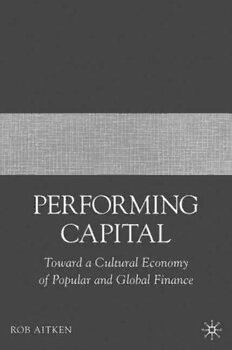
Performing Capital: Toward a Cultural Economy of Popular and Global Finance PDF
256 Pages·2007·2.07 MB·English
Most books are stored in the elastic cloud where traffic is expensive. For this reason, we have a limit on daily download.
Preview Performing Capital: Toward a Cultural Economy of Popular and Global Finance
Description:
In much of the critical tradition in political economy, capital--financial or otherwise--is depicted as a 'monstrous' or already-existing kind of structure. This books reviews a form of capital--'popular finance'--which exists in a much different way from the common depictions in political economy. This book argues that programs of 'popular finance' are important, as a site at which capital is visible not as a macro-structural reality but as a category itself which needs to be made and performed often in the spaces where is does not already exist. In order to pursue this kind of analysis, particular attention is paid to the ways in which 'culture' has been used as a way to intervene into everyday kinds of spaces and to develop a form of capital within those spaces. This cultural economy, in turn, facilitates a certain critical strategy and mode of critique. I argue that, unlike analyses which tend to mystify finance and the financial world, training attention to capital in these cultural and everyday contexts facilitates a genealogy of capital which can purposely make capital visible as a heterogeneous and 'de-centered' kind of category; a category in which 'we' ourselves are deeply implicated.
See more
The list of books you might like
Most books are stored in the elastic cloud where traffic is expensive. For this reason, we have a limit on daily download.
